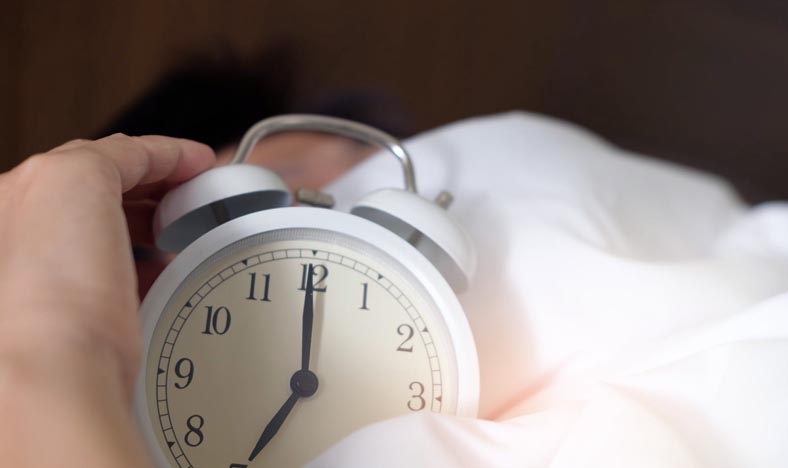
Are You Hurting Your Health By Only Sleeping 5 Hours A Night?
Even though it is possible for a person to stay awake for up to ten days – perhaps even longer – the effects of poor sleep are well-known among the population.
There is no arguing in the fact that we need sleep – and a lot of it. During sleep, our body is hard at work to process the previous day’s information and to recover, which helps the body get ready for the stress from the upcoming day.
A recent poll found that an estimated 40% of the American adult population is not getting enough sleep. With the many detrimental effects that poor sleep can have on the human body, it is vital for more awareness to be created to help these individuals understand why they need to adopt better sleeping habits.
For many people, simply sleeping for around five hours becomes something of a habit. They constantly find themselves pushing through and making do with the amount of sleep they are able to obtain.
In this post, we’ll take a look at how much sleep you need, how sleep deficiency can harm you and also look at how getting enough sleep can be a good way to gain a boost in your health. Ultimately, the information we will share will help you find out if five hours of sleep is really enough.
Contents
How Much Sleep Do I Need For My Age?
While we all need sleep to be productive, maintain a healthy mind and attend to our physical well-being, not everyone needs the same amount of sleep.
Several studies have been performed on the right amount of sleep to support bodily functions without causing a person to oversleep.
The National Sleep Foundation has recently updated their recommendations for sleep. These recommendations are divided into different categories, based on your age.
| A Teenager | Teenagers, which includes everyone aged between 14 and 17 years, should ensure they obtain at least eight hours of sleep per night, with a maximum daily sleep recommendation of ten hours. |
| A College Student | The sleep requirements for a college student would depend on their age, but since most of these individuals would fall within the category of a young adult (between 18 and 25), it is recommended that a college student obtains between seven and nine hours of sleep every night. |
| An Adult | Adults aged between 26 and 64 have a sleep recommendation that is similar to that of young adults and college students between seven and nine hours of sleep per night. |
| A Senior | The elderly have the lowest sleep recommendations on the list. Individuals aged 65 or above are advised to sleep for seven to eight hours every night. |
The Effect Of Different Sleep Times On The Body
The inability to maintain a consistent sleep schedule can be harmful to your body. Not only are you hurting your mental health, but you are also causing your physiological well-being to suffer as well.
When your sleep schedule does not allow for enough sleep and constantly changes, then changes to your Circadian Rhythms may occur, leading to an alteration in your body’s natural ability to maintain a normal sleep-wake cycle.
The Physical Benefits Of Enough Sleep
Enough sleep can contribute to a healthier, stronger body that is able to fight off disease, maintain a good balance of hormones, and help you avoid problems like fatigue and weakness during the day.
Let’s look closer at the physical benefits that adequate amounts of sleep have to offer you.
- Strengthens immunity – Sleep is important for the maintenance of the body’s immune system. One study notes that sleep assists with the distribution of T cells throughout the body, as well as assists with the production of antigen. The study also noted a positive connection between adequate sleep and lower levels of inflammation.
- Promotes the secretion of growth hormone – Growth hormone is a peptide hormone that is vital for the reproduction process, as well as many other functions in the human body. One study notes that sleep plays a crucial factor in the secretion of growth hormone in the human body and that a decrease circulating level of growth hormone may be found during periods of inadequate sleep.
- Improves work efficiency – Enough sleep contributes to improvements in productivity and efficiency in the workplace by reducing mental and physical fatigue and providing improvements in alertness, as well as in concentration.
- Keeps the skin smooth and elastic – A good night’s rest is known to help the skin glow, but the connection goes much deeper. One study found that good sleep contributes to slower aging of the skin, which preserves elasticity and also helps to keep the skin smooth and wrinkle-free for longer.
- Lowers your risk of mental disorders – Mental disorders, including depression, anxiety, and psychosis, are common conditions diagnosed in millions of patients each year. Adequate amounts of sleep may help to reduce stress and anxiety, and also lower the severity of depression and some other mental disorders.
The Effects Of Sleep Deficiency
Sleep deficiency has been linked to a wide number of problematic health issues, as well as a loss of productivity and a significantly higher risk of becoming involved in a car accident.
A study by the University of Groningen in The Netherlands explains that sleep deficiency is linked with a general reduction in a person’s overall quality of life. When you do not sleep enough, you feel moody, tired and weak the next day. You are at risk of slumbering off behind the wheel.
When it comes to investigating the effects of sleep deficiency, it is first important to realize that poor sleep habits hold both short and long-term negative effects on your general well-being.
While the difficulty concentration, inability to be alert and the poor performance in the workplace are all examples of short-term effects that are imposed on you by sleep deficiency, it is also vital to consider what may happen in the long term.
One study notes that a person who suffers from sleep deficiency also becomes more likely to develop diabetes and cardiovascular disease due to the long-term negative impacts. Additionally, there also seems to be a strong correlation between sleep deprivation and obesity.
The Benefits Of Sleeping Early

Sleeping early means you get more time to spend sleeping – this, in turn, means a longer night for you and the ability to feel more awake in the morning.
You will start to notice the benefits of sleeping early the moment you wake up – you’ll feel more refreshed, and you will not need to snooze the alarm four or five times before you can collect enough energy to get up.
Sleeping early and, in turn, getting enough sleep means you are also boosting your general cognitive performance. Since your brain gets a chance to rest and prepare for the next day, you will be less likely to experience mental fatigue.
You’ll find that your concentration and alertness greatly increases and that you do not experience severe levels of anxiety and depression as compared to when you are deprived of sleep.
Creating Healthy Sleep Habits
A series of simple, easy to implement steps can be the ultimate solution to solving your poor sleeping habits and ensuring you are able to get a good night’s sleep, every night.
This will help you to reduce the risks associated with sleep deficiency and instead give you the ability to start taking advantage of the numerous benefits that good sleep offers you.
- Keep a steady sleeping schedule – One of the most important factors when it comes to good sleeping habits is to keep a steady schedule. Try to go to bed at the same time every night, set your alarm for the same time every morning and try to get up as soon as the alarm goes off.
- Go to bed earlier – If you find that you are unable to get up in the morning, but unable to sleep a little later, then consider making some changes so that you can go to bed earlier at night.
- The right sleeping posture – The position you sleep in can have an impact on how well you sleep, how quickly you fall asleep and how long you stay asleep.
- Avoid staying up late – While it may seem beneficial to get some work done after getting into bed, you should take it into consideration that you won’t be able to sleep late the next morning. You should consider cutting an hour or so from your TV time at night or avoid using your phone in the bed to prevent you from staying up too late.
Conclusion
Sleep is one of the essential parts of a healthy body and mind. Not obtaining enough sleep leads to a series of problems, such as cognitive impairment, poor performance at work and a higher risk of chronic disease.
For many people, five hours seems like enough sleep per night, but scientific research suggests that less than seven hours of shut-eye per night will lead to a significant number of health problems in the long run.
Some simple steps can help you get more sleep to ensure you can be productive, healthy and alert.





![8 Amazing Benefits of a Futon Mattress! [Video]](https://best-mattress.reviews/wp-content/uploads/thumbs_dir/benefits-of-a-futon-mattress-20k9ftxf4l2ls2ppkt6x7ixwfkizf9nd596gxbkz4338.jpg)
